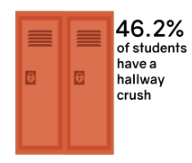Out with the old, in with the same for students in the New Year

84% of those who made resolutions kept them according to YouGov.
January 28, 2022
With 2022 just beginning, so too does the yearly tradition of the American public setting forth on their New Year’s resolutions. Perhaps due to newfound free time provided by pandemic limitations, they’re at an increased likelihood to stick to their decisions.
A 2020 poll from data analytics website YouGov found that out of the 27% of U.S. adults who made resolutions for that year, 84% maintained some or all of their resolutions. This information comes in stark contrast to a 2018 YouGov poll in which only 67% of US adults held at least some of their resolutions.
It’s not just the general public maintaining their resolutions; many CHS students say they too create and keep them. Sophomore Garrett Stemetzki of Wall Township joked about the quality of his completed yearly objectives.
“Generally, they’re horrible resolutions,” Stemetzki said.
Conversely, students such as freshman Leigh Batzar of Middletown find that their inability to fulfill their resolutions leads them to abstain from forming them in the first place.
“I have not ever successfully completed a resolution,” Batzar said.
Though some may find them difficult to make good on, New Year’s resolutions are seen as a means of positive life changes. For many, this positive change takes form in the resolution to lose weight. According to YouGov, in 2020, 48% of those making resolutions said that they intended on making a resolution to lose weight. However, many physicians warn against setting goals to slim down in 2022.
“It brings with it the potential for lowering your self-esteem and possibly contributing to or triggering an eating disorder. The disappointment and frustration associated with weight loss New Year’s resolutions can be detrimental to our emotional and mental well-being,” said the Dallas Behavioral Healthcare Hospital in a press release.
Still, students believe that resolutions can be helpful under the right circumstances.
“I think as long as they’re safe for you, they can be good,” Stemetski said.
Most importantly, if you have a goal in mind, you shouldn’t wait to put it into action.
“We can all say we are going to do something tomorrow, or the next day, or wait until January 1st, but if you are serious about making a change, then just plan to do it now and don’t wait another day,” said psychologist Rachel Goldman.














